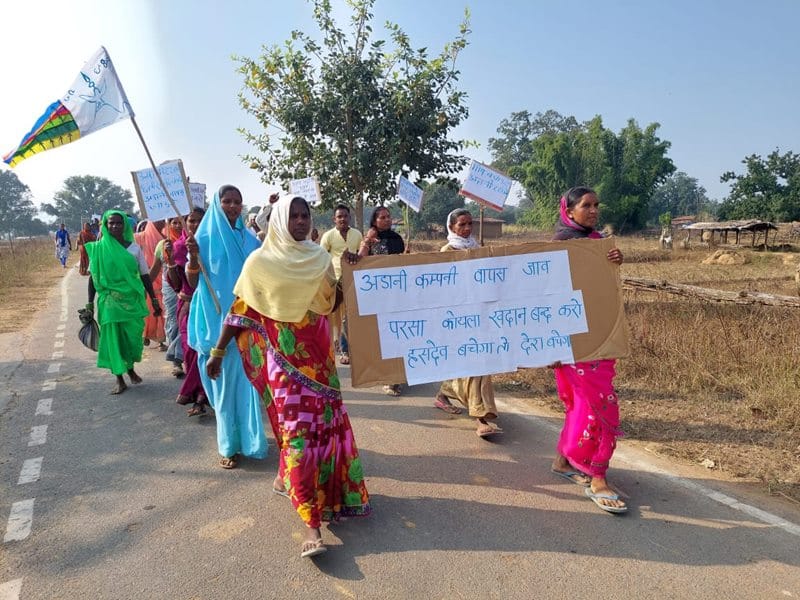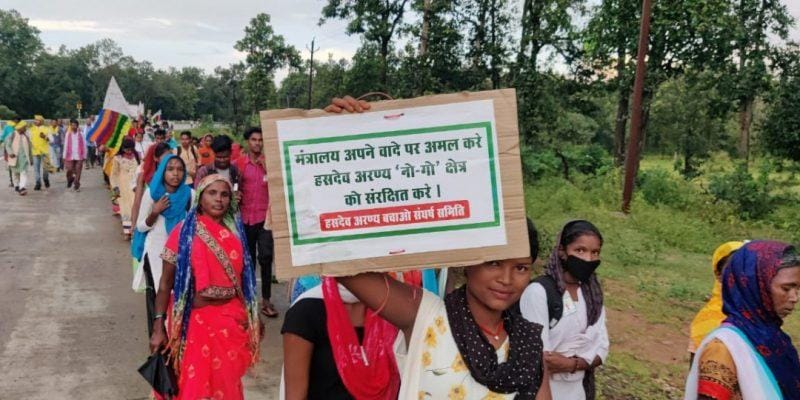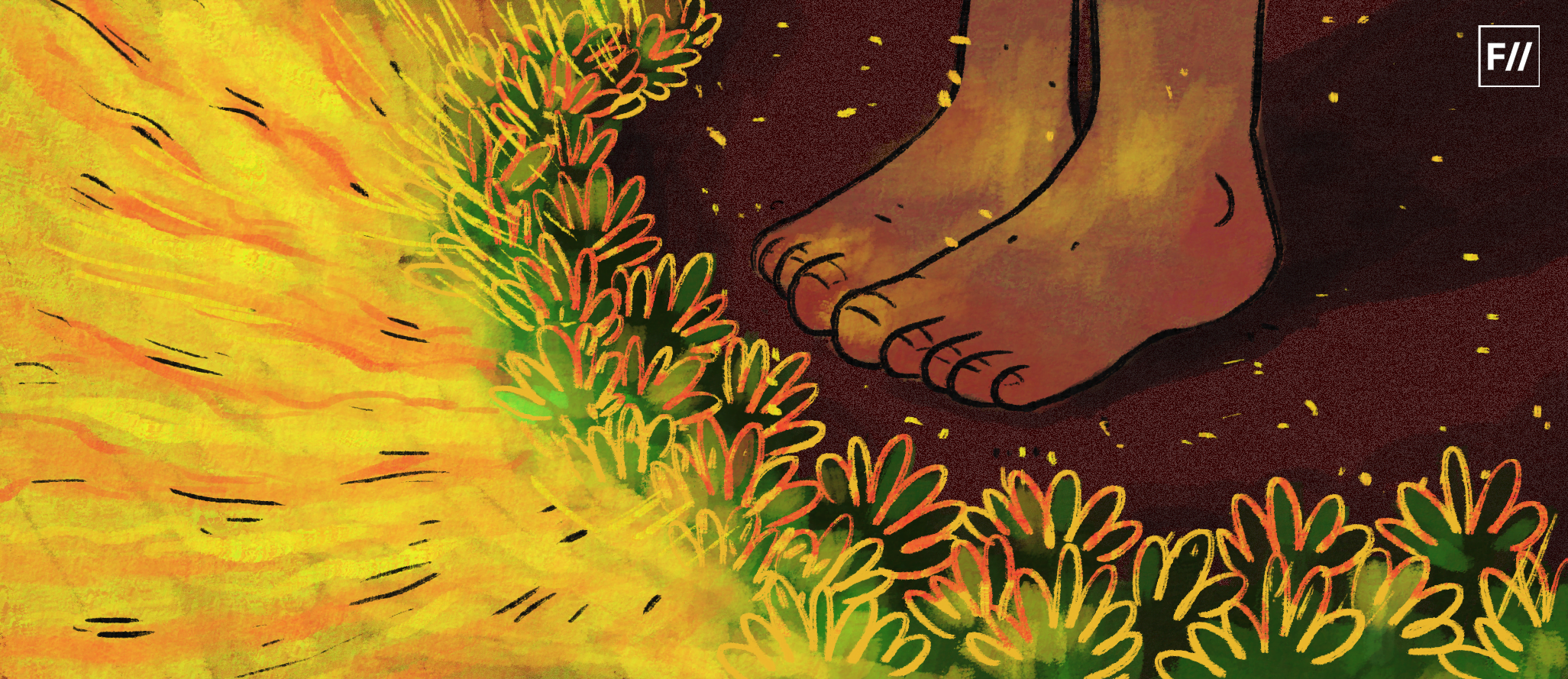A few weeks ago Hasdeo was back in the news cycle as reports of clashes between locals and police surfaced. On 17 October morning, violent clashes erupted near Parsa block in the Hasdeo forest region over the ongoing deforestation drive in the area. Protests took a violent turn when villagers took up bows, arrows, slingshots, and stones to attack the police. This fight to safeguard the forests from the extractive agendas of the State has been a longstanding conflict in Chhattisgarh. What is at stake? How is Hasdeo a feminist issue?
This fight to safeguard the forests from the extractive agendas of the State has been a longstanding conflict in Chhattisgarh. What is at stake? How is Hasdeo a feminist issue?
A few years after its creation Chhattisgarh saw accelerated interest in what was beneath its red soil – bauxite ore and coal. In 2007 the Union government allocated the Parsa East Kanta Basan (PEKB) coal mine to the Rajasthan Rajya Urja Vikas Nigam Limited (RRUVNL) which was taken up to be developed and operated by the Adani Group after a competitive bid.
In 2009, the environment ministry categorised Hasdeo Arand as a “no-go” area for mining as conservationists and environmental activists were worried about the impact of mining activities on its green cover and rich ecological diversity. The Hasdeo forest is also the catchment area of Mahanadi’s largest tributary – the Hasdeo River and provides a corridor to a significant elephant population. But mining activities continued and over subsequent years more projects were approved – endangering the natural ecosystem and displacing hundreds of tribal residents.
Hasdeo Bachao Andolan – home vs project
In 2011, after the Parsa East Kete Basan (PEKB) project received clearance for forest and environment – the Hasdeo Bachao Andolan (HBA) gained momentum. Home to more than 15,000 Adivasi people, Hasdeo is not an extractive resource pool for its original dwellers but a place of sustenance and worship. What is 5.6 billion tonnes of coal for the corporate government, it is 1,70,000 hectares of home for them. The hill is the abode of Pithormeta, the wife of Nandaraj, a highly revered deity for people from 84-gram panchayats in Bastar – not Deposit 13, as is labeled in government documents, indicative of the 326 million tonnes of high-grade iron ore.
Built by local people and activists the HBA movement has made an unprecedented mark globally in conservation activism. In April this year, forest and tribal rights activist Alok Shukla was awarded the Goldman Environmental Prize – 2024 for successfully leading a community campaign and saving 4,45,000 (4.45 lakh) acres of biodiversity-rich forests from 21 planned coal mines. In 2020 as the country was heaving under the pressure of a global pandemic, a total of 21 coal auctions had been announced. Shukla bolstered support and voice across digital platforms from the civil society while aiding on-ground protests by the Adivasi community.
Reminiscent of the Chipko movement, women of Janardanpur village mobilised to hug the trees that were scheduled to be felled for the PEKB project in April of that year.
In 2022, the PEKB phase 2 was cleared by the State government. Reminiscent of the Chipko movement, women of Janardanpur village mobilised to hug the trees that were scheduled to be felled for the PEKB project in April of that year. While the authorities turned around to see the protesters, the day was half-won. At 3 am midnight they came back and felled 300 trees. According to the clearance report by the forest advisory committee, 95,000 trees are estimated to be cut for the project.
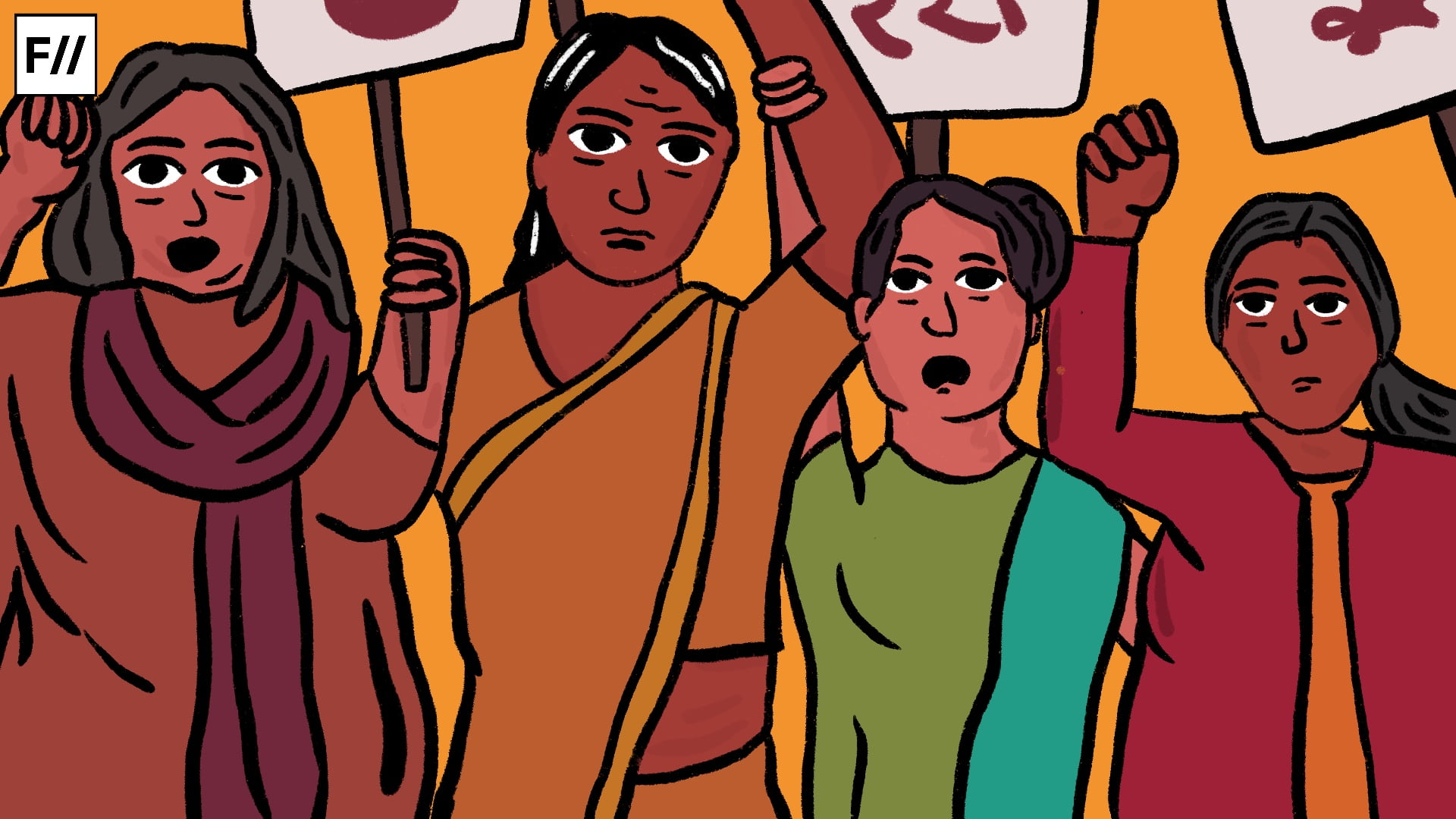
However, activists have assessed that more than 2,00,000 trees, spread over 841 hectares, must be cleared. Not only that, the phase 2 project which is spread over 1,200 hectares would displace around 700 people from Sarguja and Surajpur districts. In December 2023, at the behest of BJP’s reinstation in the state office, an estimated 15,000 trees were felled under the watchful eyes of several hundred policemen and district officials.
Congress, BJP and corporate greed
Last year BJP’s Vishnu Deo Sai moved into the chief minister’s residence as INC’s Bhupesh Baghel moved out. Within a week reports started flooding in of police “counseling” villagers to not resist the resumption of deforestation activities to kidnapping incidents. Under the past BJP government, there were claims made by locals and activists that “farzi” (fake) consent papers were signed and the mining company used counterfeit gram sabha resolution to secure clearance. Based on these clearances, in December 2018, the state government gave Adani consent to start ground operations. The same December, in the hope for change from the 15 years of BJP rule, the mandate brought Congress into power.
Five years later, Deo Sai, the first tribal Chief Minister of the State, claimed that all approvals for mining activities and felling were approved by the Congress government. If we look at the official records – 41 hectares of trees were felled in 2022, and clearance for an additional 93 hectares was granted in November 2023 – under the Baghel-led Congress government. It is also the Congress government that now has constituted an eight-member fact-finding team to investigate and assess tree-felling activities in Hasdeo.
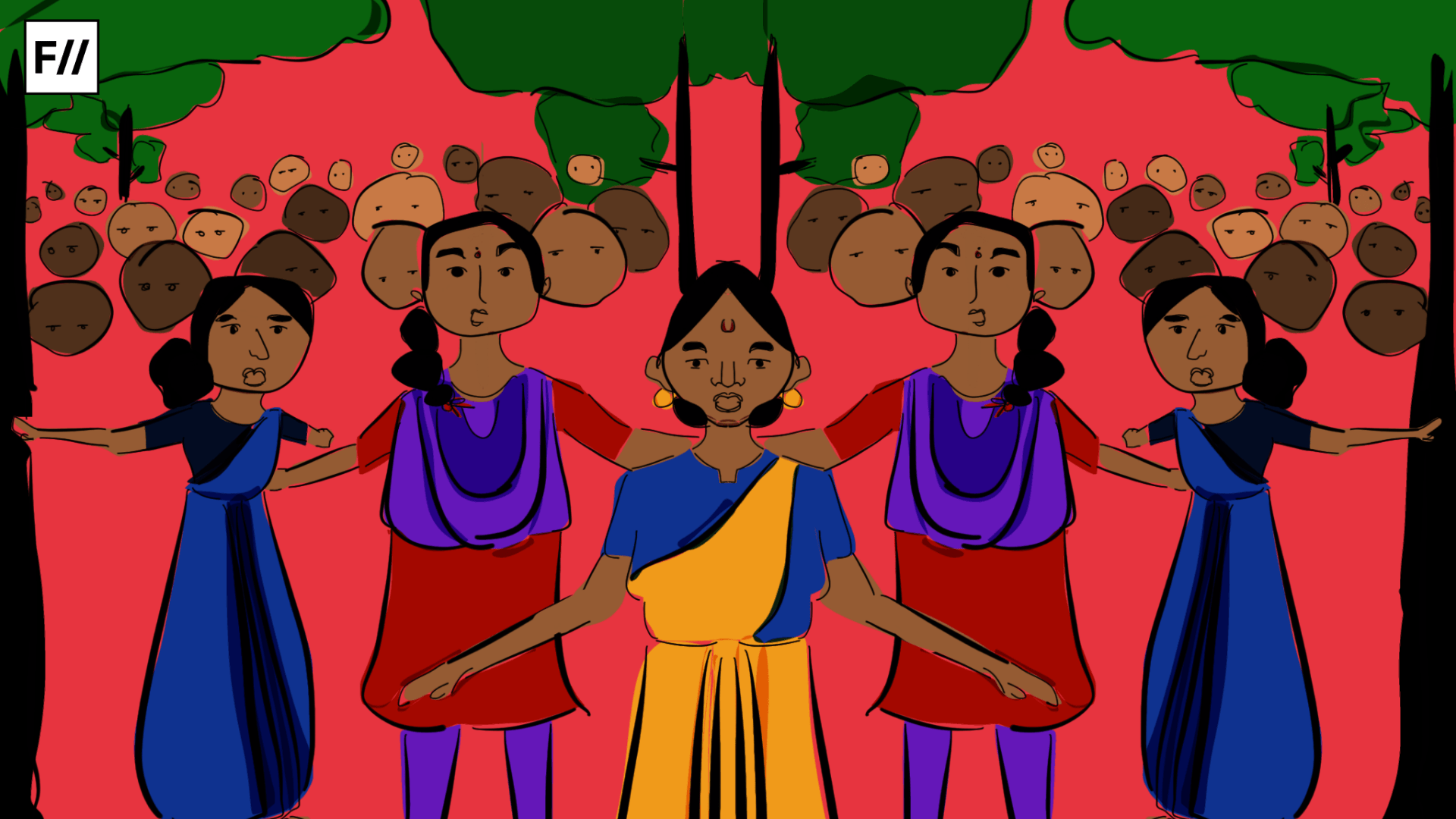
In 2020, women from Surguja led the protest against the Congress government for a proposed aluminum refinery. In an interview, one of the protesting residents Sarita Pakira said, ‘They said it is a government of the poor, of the Adivasi people. But their actions suggest the opposite… They take us for granted, we will teach them a lesson.’ The voices raised against the government, be it Congress or BJP, is indeed a protracted struggle against the corporate big brother – Adani Group’s coal mining operations in Hasdeo Arand. The corporate greed comes in the garb of policies with loopholes and administrators with deep pockets.
Why Hasdeo is a feminist issue
Women are disproportionately affected by the mining industry and forest activities. This has resulted in their active participation and often leadership in resistance. Women bear a heavier burden of displacement due to mining, including loss of livelihood, increased work burden, and vulnerability to harassment. A report by Prateek Goyal from Newslaundry covered the harrowing experiences of the villagers of Korseguda in Bastar, Chhattisgarh, who claim to face relentless abuse at the hands of security forces.
One of the most disturbing accounts is that of 23-year-old Durgavati (name changed), who was five months pregnant when she was allegedly raped by three security personnel in September 2018, while some of the personnel recorded the act. Following the assault, she was taken to a CRPF camp and later to a police station, where she was humiliated further.
Mining destroys water sources, forcing women to walk long distances to access drinking water.
Mining activities also have indirect impacts like water scarcity. Mining destroys water sources, forcing women to walk long distances to access drinking water. Entire communities are vulnerable to displacement, but women suffer disproportionately, losing economic independence and often being forced into domestic work where they face harassment. Not only that, women have been primary contributors to the Adivasi economy, relying on forest produce and biodiversity. They are also regarded as the stewards of traditional knowledge about the forests and how to utilise natural resources.
Women have been at the forefront of spreading awareness, organising protests, and mobilising their communities to fight against mining activities. Savita Rath, a local human rights activist with the GAGGA network, works alongside women in mining-affected villages, empowering them to defend their natural resources and reject mining on their land. Since 2008, she and Adivasi women have led peaceful protests in Raigarh, mobilising hundreds of villages to protect their land and rights.
In 2015, 20 Gram Sabhas unanimously passed a resolution opposing the auction of coal mines in the Hasdeo region, citing violations of the Forest Rights Act (FRA), 2006, which protects the rights of forest-dwelling tribal and traditional communities to forest resources. In 2016, the government had annulled the forest rights conferred to the village’s Adivasi residents under the Forest Rights Act to accommodate coal mining.
In a report by BehanBox, Sunita Porte, an Adivasi resident asked, ‘The jungle is my home. If we don’t keep up our fight to protect it, what will I save for our generations to come?‘ In January she and hundreds of women marched to Raipur to protest the rampant tree felling and mining activity. As October witnessed a renewed and bloodier fight against authorities – Hasdeo’s survival continues to rely on its people as corporate greed has seeped into all sectors.
About the author(s)
She/they is an editor and illustrator from the suburbs of Bengal. A student of literature and cinema, Sohini primarily looks at the world through the political lens of gender. They uprooted herself from their hometown to work for a livelihood, but has always returned to her roots for their most honest and intimate expressions. She finds it difficult to locate themself in the heteronormative matrix and self-admittedly continues to hang in limbo

